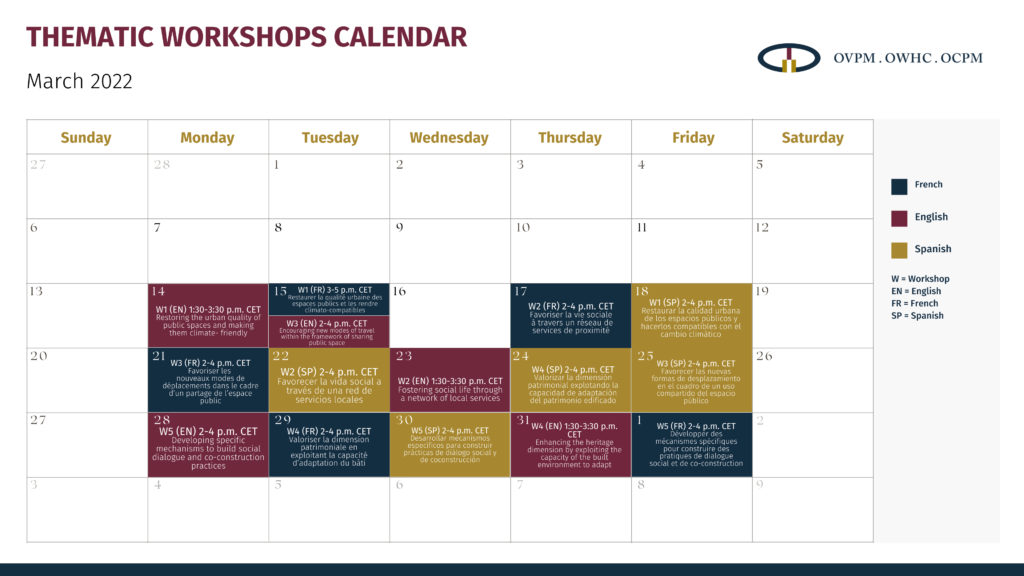Segovia
Spain
2024 – Cordoba, Spain
Summary of the thematic workshops
Summary of the thematic workshops
The 15 thematic workshops held as part of “On the Road to Québec” between March 14 and April 1st brought together 133 managers and heritage experts of 42 OWHC member cities from 25 different countries all around the globe.
9 Lead experts and 24 moderators and rapporteurs collaborated with the OWHC General Secretariat addressing 5 main themes: the transformation of public spaces, the enhancement of residential spaces, the evolution of mobility, the adaptability of built heritage and the affirmation of a new governance.
The workshops highlighted not only the actions and initiatives that are currently being implemented in OWHC member cities but also their needs and challenges. Participants also addressed potential overall strategies that can contribute both to the conservation and the urban and economic development of their World Heritage Cities.
The thematic step of “On the Road to Quebec” will be completed with the dissemination of a synthesis of the outcomes of the 15 thematic workshops. The transversal “strategic axes” that will emerge from the synthesis will give way to the second step of the process targeting to identify priority operational objectives, which will take the form of inclusive written consultations to be forwarded to all member cities at the beginning of May.
Each of the 5 workshops will be held in turn in the three working languages of the Organization (French, English, Spanish) on the following dates (click on the image to see full size)*:
Description of the workshops and participating experts
Theme 1 – The transformation of public spaces
Historic cities are rich in public spaces, such as: parks, gardens, squares, esplanades, convivial or commercial streets, and commemorative places. They are undeniable structuring elements, but their heritage value and their roles might have been greatly disturbed, or even distorted, by contemporary uses, such as: automobile traffic and parking areas. Furthermore, pedestrian or shared streets, often too mineralized, capture heat and are no longer sufficiently permeable to ensure water infiltration and drainage.
The challenge will be to adapt and revise these spaces in order to give them a structuring role in the organization of new proximity needs (residential space) of residents and to mitigate the impacts of climate change.
Workshop 1 – Restoring the urban quality of public spaces and making them climate- friendly
- How can we adapt these spaces to new functionalities (shared, mixed commercial/cultural, private spaces) and to new collective use practices while giving them a structuring role at the different scales of the city (block, neighborhood, center, periphery)?
- How to link public spaces, especially with the development of residential areas and the evolution of mobility?
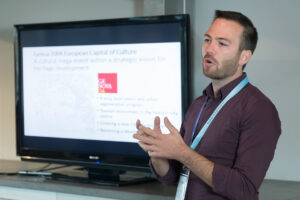
Zachary M. Jones, PhD
Postdoc Researcher and Adjunct Professor
Department of Architecture and Urban
Studies Politecnico di Milano
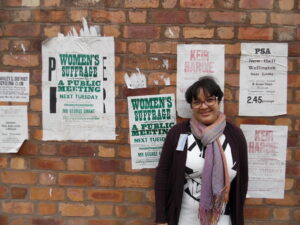
Silvia Arroyo Duarte
Arquitecta
Universidad de Panamá, Facultad de Arquitectura y Diseño (FADUP)
Sistema Nacional de Investigación (SNI)
Theme 2 – Enhancing residential areas
The enhancement of residential areas, a privileged support of daily life but often penalized by depreciation or gentrification of housing, involves questioning the ways of making these spaces convivial, livable, where all the conveniences are at hand and where a true community life develops.
Workshop 2 – Fostering social life through a network of local services
- How can we enhance residential areas in order to rediscover the “city of proximity”, centered on collective life?
- How can we improve the comfort and sociability of these spaces through a vegetation strategy at the different scales of social life?
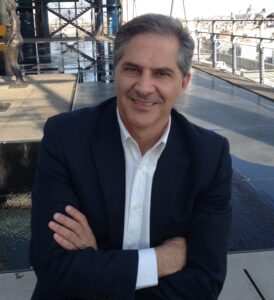
Lead-Expert, Moderator and Rapporteur
Mr. Miguel Rivas
Partner of TASO, a consulting team in economic development and innovative urban policies.
Lead expert of KAIRÓS – Heritage as Urban Regeneration, through the URBACT program.
Theme 3 – The evolution of mobility
The place of the automobile in daily life and accessibility issues have largely influenced city planning. Adapting to new ways of working, such as telecommuting, as well as aspirations for peaceful and safe environments, involve thinking differently about travel needs, and are, in light of climate change, an opportunity to revise urban functionality.
Workshop 3 – Encouraging new modes of travel within the framework of sharing public space
- How can we efficiently organize changes in travel mode according to the logic of the journey (access to the urban center, home-work connection, residential service, etc.)?
- What consequences can new modes of travel have on the development or use of public space?
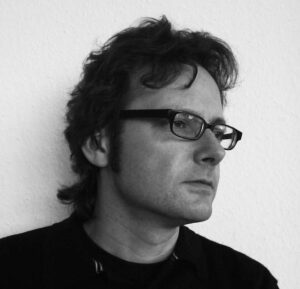
Prof. Dr.-Ing. Michael Kloos
Architect and Urban Planner
AKNW / SRL Preservation and Sustainable Development of Historic Urban and Cultural Landscapes
RheinMain University of Applied Sciences
Faculty Architecture & Civil Engineering
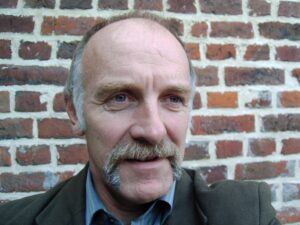
Philip Stein
Urban designer
Expert for the EU Urban Innovative Actions programme, supporting an air quality, modal shift project Cairgo Bike for the Brussels Capital Region

Joanna Koszewska, Ph.D
PhD in engineering and technical sciences with a specialization in architecture and urban planning
Theme 4 – Adaptability of the built heritage
The built heritage and the historic city often suffer from a number of issues that lead to their degradation, such as disuse of housing that no longer meets contemporary standards, lack of maintenance, poor restoration, and inappropriate over-densification. Demographic characteristics are changing, household needs are diversifying, and new types of housing are required. The adaptability of the built heritage is an essential resource when considering the transformation of the city.
Workshop 4 – Enhancing the heritage dimension by exploiting the capacity of the built environment to adapt
- How can we reconcile the enhancement of heritage with the evolution of uses, while taking into account technical requirements?
- How can we reconcile the enhancement of heritage, which favors local identity, while allowing for social and family development?
- How to improve the housing and adapt it to new lifestyles without disturbing its heritage characteristics?
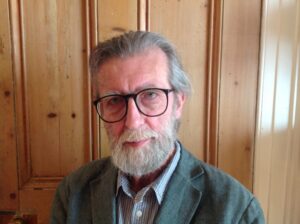
Dr John Bold
Architectural historian
Consultant to the Cultural Heritage Department of the Council of Europe
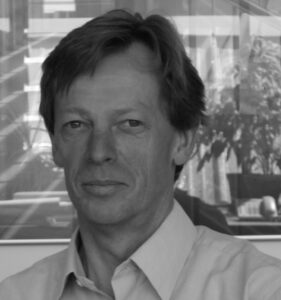
David Johnson
Architect and principal of Dannatt, Johnson Architects, an established central London practice
Theme 5 – The affirmation of a new governance
Imposing public debate at the heart of the urban project seems increasingly necessary in order to propose urban responses that are compatible with the constraints (social, environmental, technical) faced by the historic city. The evolution of democracy tends inexorably towards the participation of residents and their involvement, alongside the various urban actors, in the decision-making process concerning their neighborhoods, going as far as the “co-construction” of projects and citizen involvement in the management of interventions. Their empowerment in the processes aimed at improving the comfort, vitality, or identity of their neighborhood is a guarantee of social acceptability and sustainability.
Workshop 5 – Developing specific mechanisms to build social dialogue and co-construction practices
- How to use heritage as an identity value?
- What are the principles of project co-construction?
- What are the operational procedures involving all parties concerned in the development and management of a project?
- What sustainable economy can emerge from these processes?

Bonnie Burnham
President and Founder of the Cultural Heritage Finance Alliance
President Emerita of World Monuments Fund (WMF)

Joanna Koszewska
PhD in engineering and technical sciences with a specialization in architecture and urban planning
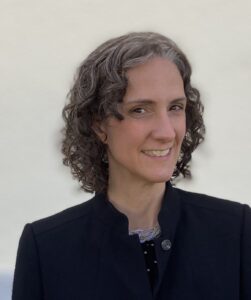
Rapporteur
Sari Uricheck
Project consultant with the Cultural Heritage Finance Alliance.
Previous World Congresses


